It’s an altar boy thing
Let's not talk about the moon, but Solzhenitsyn's 'political horror,' how to write a 'sorta memoir,' and breaking up with Twitter until the perp walk.
“Epigrams & Excerpts” is an unscripted sequence of paragraphs, images & fragments, pinging the author’s consciousness around the day in question. | by DOUGLAS JOHN IMBROGNO | sep6.2022
Enough about moonlight

Sixty-six times have these eyes
beheld the changing scene of autumn.
I have said enough about moonlight,
Ask no more.
Only listen to the voice of
pines and cedars when no wind stirs.
~ Ryonen (1797-1863)
I have not known what to do with this photo, snapped out of my driver’s side window on Route 60 East in Cabell County WV, in October 2020. So, I share it here. I am pleased, though, with the name I came up with for it. The fellow with the homemade cross sometimes walks the roadside with it, here to there, headphones on. What music is he listening to?
‘Political Horror’
There is a quatrain in my song “Little Bit O’ Light” off my first album (you can hear it on Spotify):
“The news is bad, but it always seems to be /
It’s even worse when you take it personally …“
These lines pop into my head as I write down in this post some luminous, pungent observations by Aleksandr Solzhenitsyn and a reviewer who wrote about him recently. The remarks come from a review of lesser-known books by the Russian writer (less known to me), in the May 12, 2022 New York Review of Books article, “What Solzhenitsyn Understood.”
They are words of insight suited for today’s headlines:
“Despite its relentless focus on political events,” writes Gary Saul Morson, “[Solzhenitsyn’s] The Red Wheel paradoxically instructs that politics is not the most important thing in life. To the contrary, the main cause of political horror is the overvaluing of politics itself.”
This seems a bulls-eye observation about the current baffling, continued adoration of Donald John Trump by millions of Americans.
Consider all of those folks we’ve waved to amiably, and they’ve waved or chatted back. Neighbors on our streets, shoppers picking up strawberries and hotdogs, waitresses serving us pepperoni pizzas. All the while they’re jonesing hard for the return of a wannabe autocrat with an open Dumpster where his heart is supposed to be.
Permisson Slips
Isn’t ‘political horror’ the best summation in a few words of the blithe cruelty of Trump’s reign? Meanwhile, even as the damning evidence mounts, he continues to be a role model to an astonishing, if perhaps diminishing, number of human beings.
He keeps heaving out permission slips for anyone who wishes to live out the dream of not caring what your worst thoughts and actions do to other people, near or far.
‘Look at me and my life!’ Trump declaims, in his every nasty turn of ugly speech. ‘I’ve taken a licking and I’m still ticking! You can be your awfulest self and openly despise and insult everyone not like you. Just like me! And you’ll do just fine!’
So far.
Yet haven’t Trump’s followers — and his Congressional enablers, who aren’t malignant narcissists, just power-hungry, soul-deadened sycophants — gone and overvalued politics at the expense of their very beings?
This seems the point Solzhenitsyn is making about how the Russian Revolution devolved into the “unprecedented horror” as the writer describes in his greatest work, The Gulag Archipelago (for which he won the Nobel Prize in Literature in 1970, and which led to his exile from the Soviet Union in 1974).
Morson goes on to note something Solzhenitsyn observed in his book Rebuilding Russia:
“… Political activity is by no means the principal mode of human life … The more energetic the political activity in a country, the greater is the loss to spiritual life. Politics must not swallow up all of a people’s spiritual and creative energies. Beyond upholding its rights, mankind must defend its soul.”
Morson’s review considers a couple of novels in a series by Solzhenitsyn known as The Red Wheel, a deep dive into the bloody madness birthed by the Russian Revolution. His review concludes with an observation from one of these novels that speaks to our Trumpian times.
It is a text message out of the past — to those Americans who yet thrill at the altar of politics-as-cruelty. But at what cost to them, their families, and communities?
The character Varsonofiev assesses his life in March 1917, the third book in The Red Wheel series. But it’s not a ledger of his political tribe’s achievements and scalps he totes up. It’s his very life and how he has lived it.
He contemplates, as Morson puts it, “all its irretrievable mistakes and erroneous judgments that seemed so right at the time.” Remembering his own “fervent hopes for revolution and the republic that would make life sublime,” Varsonofiev now asks rhetorically:
What could the daily political fever change for the better in the true life of men? What kind of principles could it offer that would bring us out of our emotional sufferings, our emotional evil? Was the essence of our life really political? … How could you remake the world if you couldn’t figure out your own soul?
It’s a ‘sorta memoir’ thing
That line — ‘Was the essence of our life really political?’ — especially resonates with me because of something that happened on my Twitter timeline this week. I have been wrestling with the on-again, off-again addictive pull of social media. (‘You have switched to ‘Latest Tweets …’ is a sign you’re hooked on Twitter-jacked endorphins.)
That powerful pull hits even harder as we who are not Trumpublicans long to rubberneck at Citizen Trump’s perp walk, which seems closer than ever, yet achingly out of sight.
But I am also rounding third and heading for home on a book-length “sorta memoir,” which I’ve been dabbling with for decades. It begins in my altar boys days in southern Ohio and then goes …
Well … oh, the places you’ll go.
I owe a “shitty first draft” to my fabulous memoir overseer/writing coach/soothsayer out in California not too many weeks from now.
This work is — may I say it — some of the best writing in my life. And I’ve done a lot of writing in my life. This book-length, ‘fictionalized non-fiction’ account tells of not only figuratively fun-and-crazy days here and abroad (New York, Paris, Dublin, London), but not-so-fun, literally crazy ones.
Even in ‘sorta memoir’ form, the details will be — there’s no other word for it — a little shocking to friends and family who do not know the full story of what went down. And how exactly I went up and up and then down and down. Rinse and repeat.
It’s not at all all-dark, though. I’m still here, after all. And feeling more decent than perhaps most any other time in this current incarnation, so far. You can read some non-shocking chapters, here, here, here and here … )
NOTE: For updates on the book’s eventual release, free subscribe to: thestoryisthething.substack.com
Framed
Yet the only way I can give this writing project the sustained, uninterrupted focus my easily perturbed Muses require to get it over the finish line is to get the %$###!@@! off social media.
Thus, I have several times in recent months resolutely logged off my main three platforms: Twitter, Facebook, and Instagram.
Then the news breaks hard. Or I need to promote a new all-poetry issue of my monthly WestVirginiaVille feature magazine. And the issue gets so much love I must — no, really, I must! — spend days responding to all the commentary from a gamble that 25 poems and Q’s-and-A’s with kickass poets (including newly inaugurated U.S. Beat Poet Laureate John Burroughs, who — how about that! — is a West Virginia native) might find an admittedly not-large, but not teensy enthusiastic audience online.
Very cool!
Meanwhile, my Muses — a flighty bunch — flee their garret every time I fall into the social media rabbit-hole, which goes on forever. (A variation of Wonderland that might be called WhatTheHellLand.)
So, I deep-sixed FB this morning for an unspecified, writerly while. And then Instagram. And then, I flipped the switch off Twitter on my laptop.
Man, I’ve got this.
I can make lemons — and manuscripts! — out of the lemonade by heeding Aleksandr’s advice and attending wholeheartedly to my non-political life.
Then, I notice the growing backlash (on the still-functioning Twitter app on my phone) against Judge Aileen Cannon, who this week granted Trump a Special Master to review the Mar-A-Lago classified stash. Thus delaying his perp walk — as the Donald and his expensive attorneys have ever sought to slow-walk his perp walk.
Really, it’s the man’s life work.
And, so, like a Jack Daniels lover in recovery falling off the wagon, I fall into a Twitter thread of outrage about the ruling by this Trump-appointed judge (and how convenient that is!).
So it is is that I post a single comment underneath a story that shows the judge’s face, intending to play off her name and — in my mind — the phrase ‘loose cannon.’
My tweet: “She’s certainly loose.” Meaning she’s certainly a loose cannon. Checking my phone a few hours later, I am alarmed to find a sequence of nasty comments of what looks to be a reaction-wave developing. Such as:
‘Misogynist much?’ ‘When did the left-wing start attacking women?!’ ‘What exactly do you mean by that?!?…
And so forth. Geesh. I delete my ill-advised joke tweet. I should have made the joshing more clear: ‘This Trump judge is the very definition of a loose ‘Cannon.’‘
Yet some social media flub — and then a resulting outrage cycle that turns my Twitter handle into a bulls-eye — was bound to happen, I now see. Especially if I spend way too much time on the Outrage-Cycle Roller Coaster.
It is just too easy to get caught up in the righteous commentariat: ‘Ha! ‘I can outwit THAT one with this even wittier put-down and cutting expression of my political rage …’
It’s a jungle out there. And Solzhenitsyn is correct:
“The more energetic the political activity in a country, the greater is the loss to spiritual life. Politics must not swallow up all of a people’s spiritual and creative energies …”
Thus, I blitzed the Twitter app off my phone, too. So, my only public-facing wordage at the moment is this obscure blog and its companion substack newsletter. You 100 or so subscribers of this blog/newsletter have my permission to leave breadcrumbs out on the other platforms:
‘Hey, Doug has mostly gone off the digital grid. You won’t find him ANY-where except at his eccentric writerly blog almost NO-one reads, except for the people who do ….’
I’ll be mostly on hiatus awhile, avoiding the churning waves of our pixelated ocean of commentary. Plus, this post is itself a break from working most of the Labor Day weekend on my sorta memoir. (And, too, because I wished to share Mister Solzhenitsyn’s timeless wisdom and smarts with someone.)
Which is to say: the Muses are back! And ready to rock.
And I am not going to tweet the news.
PS: Oh, wait. I did. ( I need an intervention…)
But NOW I’m off Twitter. ;-)

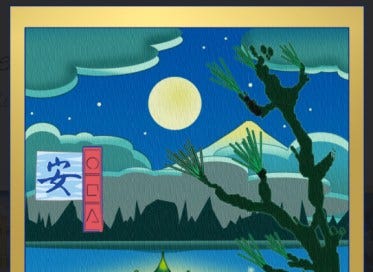




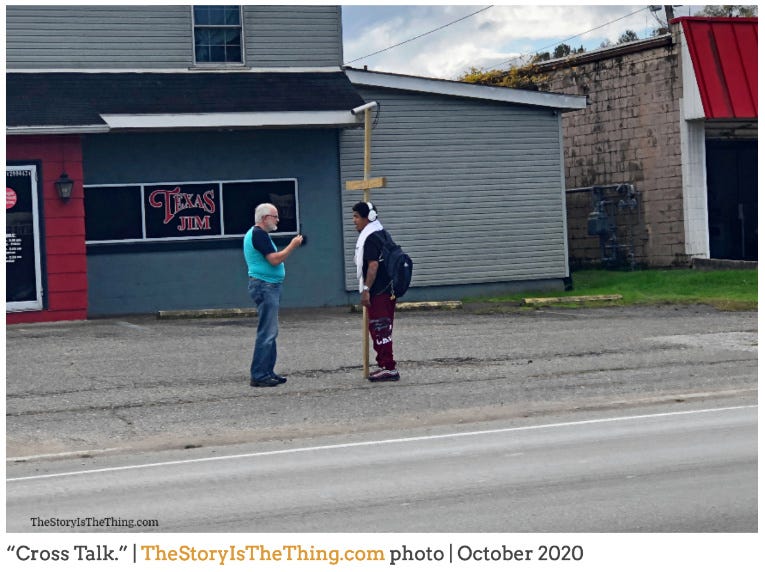
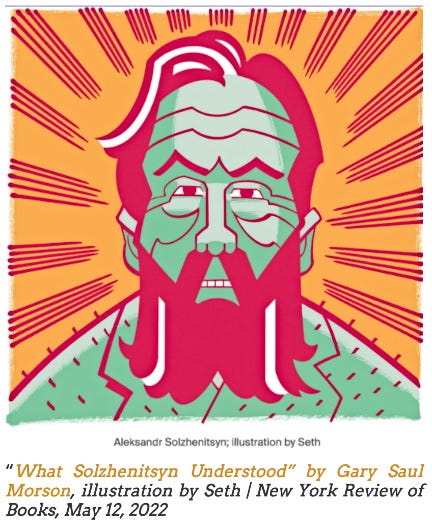

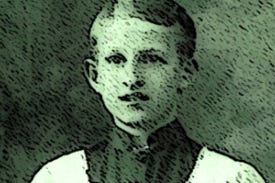
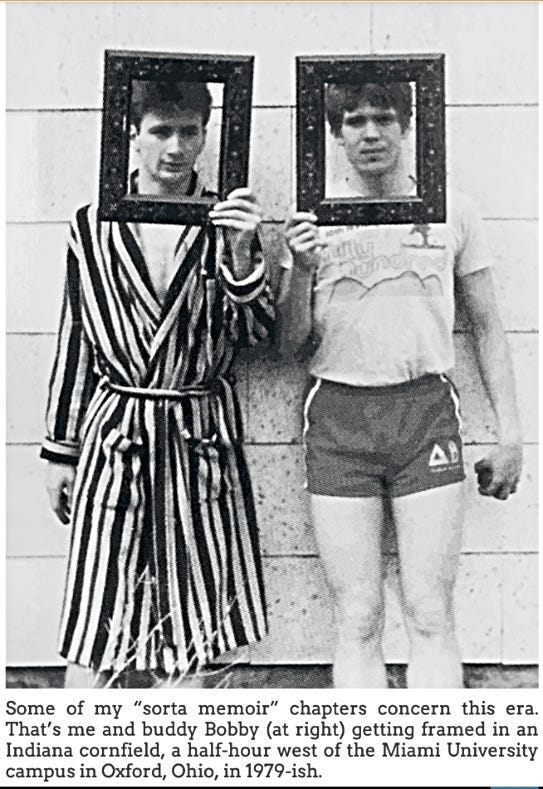
Thanks for the commentary thoughts. You may be right on shorter/more often. I grew up on long-form magazines back in the day. (Esquire, NYRB, The Atlantic ... hard addiction to break.) As to your MAGA WV riff, the entire existence of my OTHER web publication, the monthly multimedia feature magazine https://WestVirginiaVille.substack.com (companion substack to the website https://WestVirginiaVille.com) is intended to regularly demonstrate there are — as there have ever been — alert minds, creative souls, and good folk in every nook, cranny and holler of the Mountain State who abhor everything He Who Shall Not Be Named stands for. Onwards.
Did you see the delightful West Virginia challenge in a New York Times Sunday magazine column a few weeks ago? https://www.nytimes.com/2022/08/11/magazine/judge-john-hodgman-west-virginia.html Made me yearn desperately, in vain, for a couple Tudor's biscuits.
The column surprised me by raising an issue I've always wished some West Virginia reporter would write about—but not you. Writer has to be a WVU grad or close to it, someone who has lived in close quarters daily long-term with West Virginians from every town, hollow, and hamlet—inadvertent research.
Most published WV writers and nearly all observers who live elsewhere stereotype West Virginians as MAGA Appalachian natives, ignoring those born and bred in the 0hio Valley/northern panhandle/oil & gas country/Pennsylvania border areas, who at least pre-Fox/Sinclair did not embrace Confederate values. John Knowles and Davis Grubb were representative.
Then what about the mystery eastern panhandle? How could it be West Virginia in its gut, as a western Maryland-West Virginia sandwich on Pennsylvania-Virginia bread? Henry Louis Gates Jr, anyone? I'd love to see something comparing/contrasting it all. A psychologist once told me which central WV town he thought qualified as undiluted WV. …